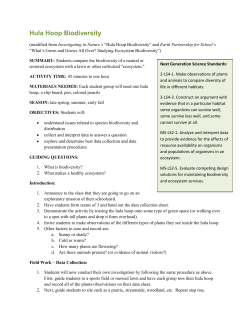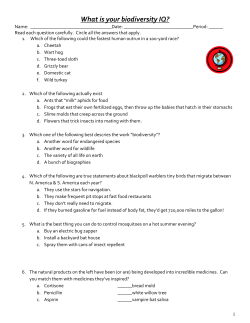
Ms Anne-Julie Rochette, Programme Officer, CEBioS
The CEBioS programme Belgian Institute for Natural Sciences and Belgian Development Cooperation 21 May 2015, Cape Town, South Africa RBINS, OD Nature, CEBioS Anne-Julie Rochette (Programme Officer CEBioS) The CEBioS programme l based at the Royal Belgian Institute of Natural Sciences l funded by the Belgian development cooperation l provides capacity building on biodiversity policy and research related to biodiversity, thereby promoting sustainable development in developing countries. Multilateral, European and national framework: l Convention on the Biological Diversity and CBD strategic plan for biodiversity 2011-2020 l EU 2010-2020 Biodiversity strategy l Belgian National Biodiversity Strategy 2020 on the conservation, management and sustainable use of biodiversity Expertise and people at RBINS, OD Nature We cover •The terrestrial environment •The freshwater environment We have expertise in •The marine environment •Ecology •Worldwide •Molecular biology •Nature conservation and protection •Biodiversity •Chemistry We are •Hydrodynamics •About 100 people •Modelling •Spread over 3 locations •Databases •Large and diverse expertise •Image processing •Strong reputation in the respective fields 6 strategic objectives (2013-2023) OS6 : Strengthening awareness and capacities concerning the Protocol of Nagoya in Belgium and in the partner countries Transversal themes Biodiversity and ecosystem services for the reduction of poverty OS5 : Strengthening knowledge about measuring, reporting and monitoring of political choices and interventions OS4 : Mainstreaming biodiversity and ecosystem services in the political sectors linked to development cooperation OS 1 : Strengthening the scientific and technical knowledge base OS 2 : Strengthening the exchange and the use of information in a.o. governance OS 3 : Contribution to public awareness Calls 33 countries are eligible for our calls (unless otherwise specified): Algeria - Benin - Bolivia - Burkina Faso - Burundi - Cabo Verde – Cambodia - Cote d'Ivoire - DR Congo - Ecuador – Gambia – Ghana – Guinee – Guinee Bissau – Kenya – Laos - Liberia - Mali - Morocco - Mozambique - Niger – Nigeria - Palestinian Territory - Peru - Rwanda - Senegal - Sierra Leone - South Africa - Tanzania – Thailand - Togo - Uganda – Vietnam This list of countries includes: 18 partner countries of the Belgian governmental bilateral cooperation lBanque Ouest-Africaine de Développement (BOAD) lEconomic Community of West African States (ECOWAS) lEast African Community (EAC) lMekong River Commission (MRC). l OS 1 : Strengthening the scientific and technical knowledge base Training of individual scientists In situ training Publication and dissemination Institutional strengthening Type 1 grants: Trainings and access to collections organized in Belgium for individual scientists: skills (e.g. taxonomy, modelling), research, publications, access to collections and archives (15-20 per year) Annual calls (each year in December) lShort-term trainings (3-4 weeks) lRenewable 2 times if needed and evaluation is positive by Belgian tutor. l Type 2 grants: Support for taxonomy-based research and training projects in the South → in situ training: individual or in workshops, on data collection, research skills, collection management etc •Annual calls (each year in February) •Only open for RBINS researchers to perform field work and in situ training in a partner country •6 OS 2 : Strengthening of the exchange and the use of information in a.o. governance The Clearing-House Mechanism (CHM): a CBD tool for publishing and sharing information on biodiversity In practice, the Belgian CHM Focal Point loffers training courses in the development and maintenance of websites lhosts CHM websites on its web server loffers long-distance support lhelps to stimulate networking and the exchange of experiences through the organisation of workshops Annual call for CHM reinforcement To help partner countries boost their contribution to the CHM websites. The objective of the initiative is to obtain websites that are: lofficially endorsed by the national authorities loperational both in terms of format and content lupdated with the relevant data lcontain comprehensive information and national documents The call is open to CHM National Focal Points of partner countries of the Belgian CHM: Benin, Burkina Faso, Burundi, Côte d'Ivoire, D.R. Congo, Ghana, Guinea, Guinea Bissau, Kenya, Liberia, Morocco, Niger, Rwanda, South Africa, Tanzania. OS 3 : Contribution to public Local projects on the dissemination of information awareness Public awareness Dissemination of research output Annual call for education and public awareness Local projects on the dissemination of information to the large public, schools, events, posters, brochures, stakeholders meetings: e.g. in Madagascar, Benin, Niger, Burundi, DR Congo 2015: deadline: 15 June The call is open to CHM National Focal Points of partner countries of the Belgian CHM: Benin, Burkina Faso, Burundi, Côte d'Ivoire, D.R. Congo, Ghana, Guinea, Guinea Bissau, Kenya, Liberia, Morocco, Niger, Rwanda, South Africa, Tanzania. OS5 : Strengthening knowledge about measuring, reporting and biodiversity (MRV) of political choices and interventions Structure: partnership between National focal point to the CBD or CHM For the policy aspect: coordination, implementation and reporting Research institute (university or research center) For the scientific aspect: collection and processing of data 1st call Annual MRV Calls for one-year funding launched Follow-up and scientific support by CEBioS and relevant end of March Belgian experts, in collaboration with GBIF and BIP 2015 Opening meeting in Brussels Closing regional meeting in one of the elected countries Output: Development, assessment or implementation of indicators in the framework of NBSAPs 2 meetings to bring people from all selected projects together exchange of ideas, best practices and problems Eligible countries in 2015: Benin – Burkina Faso – Burundi – DR Congo – Ivory Coast – Mali – Morocco – Niger The CEBioS programme http://cebios.naturalsciences.be). Royal Museum for Central Africa Missions To conduct top quality research at an international level To conserve, manage and make available the rich collection of African organisms and associated data To stimulate knowledge transfer, in particular towards partners in Africa Contact person at RMCA: Patricia Mergen patricia.mergen@africamuseum.be Training & Access •Priority: African partners •Individual training •Group courses •In – situ & ex-situ Data dissemination •Priority: African partners •Global networks •Open Access •Visibility and fitness for use Congo Biodiversity initiative Consortium of four institutes (RMCA, RBINS, NBGB, UNIKIS) Inventory of the biodiversity of the Congo basin (fauna & flora, terrestrial and aquatic) Multidisciplinary expeditions 2009 & 2010 Capacity building Training and PhD programmes, collaborative projects Creation of a regional Biodiversity Centre (Centre de Surveillance de la Biodiversité) Rehabilitation of the Herbarium of Yangambi www.congobiodiv.org © Pierre-Denis Plisnier Ichthyology FishBase Ichthyology RMCA founding member of international FishBase consortium and responsible for information on African fishes. •www.fishbase.org with 9 mirror sites •> 35 million hits per month •> 1000 citations, including 8 in Nature and 20 in Science •www.fishbaseforafrica.org Collaboration with GBIF Sub-Saharan African Biodiversity Information Network Project CABIN (Central African Biodiversity Information Network) financed by the Belgian cooperation from 2008 – onwards ) , More info at : http://cabin.cybertaxonomy.africamuseum.be/
© Copyright 2025










